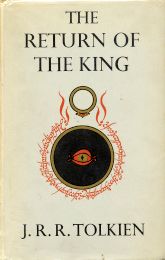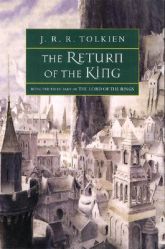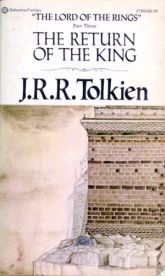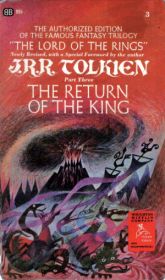The Return of the King is probably the volume of J.R.R. Tolkien’s trilogy that I remembered the least.
It’s also the book that differs the most from Peter Jackson’s film treatment. But Return of the King has always been my least favorite of the three movies, and many of the wonderful moments in that film — the lighting of the beacons, Faramir’s charge on Osgiliath, the catapult battle, Pippin and Gandalf’s discussion about the afterlife — are scenes that Jackson either invented or wildly embellished. (Unfortunately, PJ also invented Sam and Frodo’s falling out over some missing lembas wafers. Ugh.)
 So there were all kinds of gems awaiting me on my re-reading of ROTK. I had completely forgotten about Beregond, Guard of the Citadel, and the heroic role he plays in saving Faramir from death at the hands of Denethor. I had only a faint recollection of Ghân-buri-Ghân and the Wild Men. I didn’t recall that our heroes have a run-in with Saruman before the Hobbits return to the Shire. I had forgotten that the only reason Merry was able to wound the Lord of the Nazgûl was because of his sword, picked up at the Barrow-downs in the early chapters of Fellowship.
So there were all kinds of gems awaiting me on my re-reading of ROTK. I had completely forgotten about Beregond, Guard of the Citadel, and the heroic role he plays in saving Faramir from death at the hands of Denethor. I had only a faint recollection of Ghân-buri-Ghân and the Wild Men. I didn’t recall that our heroes have a run-in with Saruman before the Hobbits return to the Shire. I had forgotten that the only reason Merry was able to wound the Lord of the Nazgûl was because of his sword, picked up at the Barrow-downs in the early chapters of Fellowship.
The first half of the book (book 5 of the Lord of the Rings proper) has simply masterful pacing. The way the tension builds throughout the siege of Gondor… and then Gandalf confronts the Lord of the Nazgûl… and then suddenly the horns of the Rohirrim blow… and then we backtrack to see the ride of the Rohirrim… oh man, is that good. It’s the big build-up that was sorely lacking before the battle of Helm’s Deep in Two Towers.
A single theme kept running through my head as I read Return of the King. It’s the way evil acts continually redound to the greater good in the end. Think of how Merry found his sword. The Hobbits’ capture by the wights in the Barrow-downs certainly seemed like a bad turn when it happened; but this serendipitous encounter enables Merry to critically wound the Nazgûl at just the right time, thus possibly saving the entire battle from going sour and changing the fate of all Middle Earth.
But nothing’s that cut and dried in Return of the King. There’s an unsettling kind of moral determinism lurking behind the scenes here, and indeed throughout the entire trilogy. Perhaps “moral determinism” is the wrong thing to call it, but I can’t think of a better phrase to use. It’s this pervasive sense that not only does the darkness exist, but it’s actually necessary and an integral component to the light.
Why do I think that? Because it seems like Tolkien is constantly giving us matched pairs of characters, one of whom turns to the path of light and one of whom follows the path of darkness.
Take for example the characters of Denethor and Théoden, the Steward of Gondor and the King of Rohan. Clearly Tolkien means to draw very strong parallels between the two. Notice the similarities:
- Both are rulers of their respective lands (Gondor and Rohan)
- Both have recently lost firstborn sons in battle (Boromir and Théodred)
- Both have ambivalent feelings about their remaining heirs (Faramir and Éomer)
- Both are confronted with a devastating siege (Minas Tirith and Helm’s Deep)
- Both have been striving against an insidious higher power (Sauron and Saruman)
- Both take on a Hobbit squire (Pippin and Merry)
- Both men had fathers for whom Aragorn fought in his youth (Ecthelion and Thengel)
- Both are initially mistrustful of Gandalf
- Both eventually grant Gandalf favors early in the saga (access to the Gondorian archives and the loan of Shadowfax)
- Both die in The Return of the King
But obviously there’s a crucial difference between the two; one selflessly redeems himself and dies in battle, while the other stews in his bitterness until he finally commits suicide.
 Denethor is constantly boasting about his uncanny foresight into the events that are shaping the War of the Ring. But Théoden clearly has a touch of it too; he knows that he won’t be returning from Minas Tirith, and tells Éomer as much. “If the war is lost, what good will be my hiding in the hills?” he responds to Éomer’s suggestion that he sit out the battle at Minas Tirith. “And if it is won, what grief will it be, even if I fall, spending my last strength?” Contrast this with how Denethor reacts to Gandalf’s suggestion that he ride out to battle: “Battle is vain. Why should we wish to live longer? Why should we not go to death side by side?”
Denethor is constantly boasting about his uncanny foresight into the events that are shaping the War of the Ring. But Théoden clearly has a touch of it too; he knows that he won’t be returning from Minas Tirith, and tells Éomer as much. “If the war is lost, what good will be my hiding in the hills?” he responds to Éomer’s suggestion that he sit out the battle at Minas Tirith. “And if it is won, what grief will it be, even if I fall, spending my last strength?” Contrast this with how Denethor reacts to Gandalf’s suggestion that he ride out to battle: “Battle is vain. Why should we wish to live longer? Why should we not go to death side by side?”
The symbolism in the manner of their deaths is telling. Théoden is crushed under the weight of his slain horse Snowmane, rallying his troops to battle to save someone else’s country; with his dying eyes, he sees “[a] grim morn, and a glad day, and a golden sunset.” Denethor, meanwhile, perishes in a bier of fire, which is about as close as Tolkien ever comes to suggesting the existence of a Hell.
It’s not just Denethor and Théoden that get the duality treatment. There are other similarly matched pairs in The Lord of the Rings: Frodo and Gollum. Gandalf and Saruman. Faramir and Boromir. Aragorn raises an entire company of shadow warriors whose ancient faithlessness and treachery stand in stark contrast to his company of long-suffering and loyal Dúnedain.
But the two characters whose duality I find the most interesting are Sauron and Galadriel.
Galadriel has held the realm of Lothlórien in a state of suspended animation for hundreds or thousands of years, clinging to the golden age of the Elves as long as possible. She rebelled against the Valar and left the Blessed Realm to follow Fëanor, as The Silmarillion tells — but despite her best efforts, the day of reckoning must come. Time moves on, and Galadriel will have to return to Valinor and face her judgment.
But isn’t Sauron really just the mirror image of Galadriel? (Frodo even sees his Eye in Galadriel’s mirror.) Sauron too is a rebel against the Valar, trying to forestall judgment and recapture a long-lost golden age. But for Sauron it’s not Valinor he seeks to emulate but Thangorodrim, the fortress of his master Morgoth in the First Age. And what would Sauron do if he got a hold of the Ring? He’d bring the world into subservience, he’d eradicate the line of Númenor and chase the last remaining Elves away, he’d set up an eternal and changeless kingdom of darkness that would last “unto the ending of the world.”
Interesting that neither Sauron nor Galadriel are capable of making anything new. Sauron’s orcs and trolls are but crass imitations of Elves and ents, and his Mordor is just a recreation of Morgoth’s Thangorodrim. Likewise Galadriel’s Lothlórien is little more than a pale imitation of the glory of Valinor beyond the sea. (“[T]hey attempted nothing new, living in memory of the past,” says Tolkien in the appendices, writing about the keepers of the Three Elven Rings.)
 It’s no accident that the destruction of the One Ring also leads to the destruction of Galadriel’s Ring too, and the end to her idyllic land of Lórien. Sauron’s puppet Saruman even gloats about it when Galadriel and company encounter him in Dunland:
It’s no accident that the destruction of the One Ring also leads to the destruction of Galadriel’s Ring too, and the end to her idyllic land of Lórien. Sauron’s puppet Saruman even gloats about it when Galadriel and company encounter him in Dunland:
‘I did not spend long study on these matters for naught. You have doomed yourselves, and you know it. And it will afford me some comfort as I wander to think that you pulled down your own house when you destroyed mine. And now, what ship will bear you back across so wide a sea?… It will be a grey ship, and full of ghosts.’
The crucial difference between Sauron and Galadriel is that Galadriel has the chance to take control of the One Ring. Frodo offers it to her, in Fellowship, giving her a possibility of extending her exile from Valinor indefinitely. But she turns him down, thus earning the likely forgiveness of the Valar. Sauron and Saruman aren’t so lucky; on their deaths, their spirits are both blown away. Saruman’s shade specifically yearns for Valinor and forgiveness: “For a moment it wavered, looking to the West; but out of the West came a cold wind, and it bent away, and with a sigh dissolved into nothing.”
So we have several pairs of characters, one of whom takes the light path and one of whom takes the dark path. Sometimes it feels like everyone in Middle Earth has an ideological counterpart floating around, and that every good deed is being canceled out by an evil deed somewhere else.
In the end, of course, good and evil don’t entirely cancel each other out in Tolkien’s universe. The pity of Bilbo and Frodo saves Middle Earth and has long-lasting consequences. If either had given in to their impulses and slain Gollum when they had the chance, Frodo would have never made it to Mount Doom — and he would have never tossed the Ring in the fire if he did.
But what I find interesting is that the evil acts were necessary to the success of the quest as well. Frodo’s pity would have come to nothing in the end if not for Gollum’s savage greed and the seductive evil of the One Ring. It’s that very power that drew Gollum out of the Misty Mountains to search for Bilbo in the first place. And it’s only because of that unceasing lust that Gollum is hanging around Mount Doom waiting to seize the Ring in the end.
Similarly, Merry wouldn’t have gotten a hold of a magic sword of Westernesse if he hadn’t been captured by the wights of the Barrow-downs. Aragorn wouldn’t have had an army from the Paths of the Dead to command if the Shadow Host hadn’t broken their oaths to Isildur long ago. Treebeard wouldn’t have roused the ents to war if Merry and Pippin hadn’t been hauled to Fangorn by the orcs.
 “Strange and wonderful I thought it that the designs of Mordor should be overthrown by such wraiths of fear and darkness,” says Gimli, referring to the Shadow Host. “With its own weapons was it worsted!”
“Strange and wonderful I thought it that the designs of Mordor should be overthrown by such wraiths of fear and darkness,” says Gimli, referring to the Shadow Host. “With its own weapons was it worsted!”
So good and evil are striving in Middle Earth, testing each other, canceling each other out, and all getting tied up in a neat little package at the end of The Return of the King. It all hearkens back to the Music of the Ainur in the opening chapter of The Silmarillion, the Genesis of Tolkien’s cosmology. You’ll remember that during that act of creation, Melkor attempts to overwhelm the theme of Eru (God) with ideas of his own. As Tolkien writes, Melkor’s competitive theme is loud and repetitive, almost a mockery of the original music.
But Melkor, too, is a creation of the mind of Eru. In other words: evil was clearly a part of Eru’s design from the beginning. And so there’s nothing Melkor can do that doesn’t ultimately reflect on the glory of the whole symphony. Because in Tolkien’s Middle Earth, darkness is the opposite of light, but also its enabler.
All the works of the enemy — and the Valar — ultimately reflect the glory of Eru the One. As Frodo says when he sees Arwen arriving at Minas Tirith like a star shining in the evening: “Now not day only shall be beloved, but night too shall be beautiful and blessed and all its fear pass away!”
The grand symphony in Tolkien’s universe is Eru’s, and both the day and the night are His design. But why He chose to write it this way is unknown, and maybe unknowable.